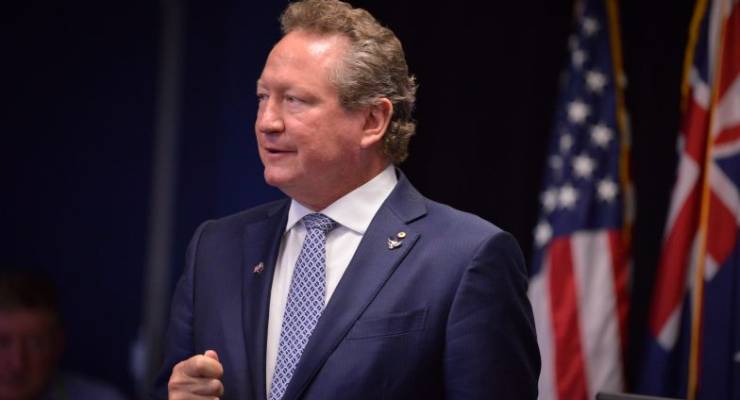
A little over 10 years ago, on May 15, 2018, Andrew Forrest’s Fortescue Metals Group waved off its first shipment or 170,000 tonnes of iron ore from Port Hedland.
It was a moment that would change Australia’s mining sector: for the first time the cash cow at the heart of Australia’s twin mining peaks, BHP and Rio Tinto, would be seriously challenged — by a company that would show there was a different way of dealing with China. Only 14 months after that boat sailed, Rio would become embroiled in the embarrassing Stern Hu bribery affair and FMG would thrive.
In that decade, Australia has become often intimately embroiled with John Andrew Henry Forrest, a duffle bag of contradictions. At once charming and infuriating he is a deeply, often obsessively private open book.
The FMG playbook
FMG has been a heart in your mouth ride, predicated on one single bet: China’s rise would continue and gather such pace, it would see him and his company through to financial safety. Ten years later, Forrest’s near as dammit to home picking the Chinese market better than anyone I have met through two decades of business journalism, including over four years in Beijing when I got to know Forrest.
Using an expertly stitched together network of Chinese “friends” on both sides of the Australia/China fence, Forrest has ridden the conviction the Chinese Communist Party/state would continue to load up with debt for long enough for Forrest to unload his. Such risky plays have their moments, and in 2013, as FMG’s debt peak over $12 billion, the iron ore price collapsed to under $40 per tonne, from over $100 per tonne and Forrest was hanging on by a thread.
But Forrest was the unlikely souffle, to appropriate Paul Keating’s devastating dismissal of former Liberal Party leader Andrew Peacock, which managed to rise twice.
As he sits in the top 500 richest people in the world with a fortune of over US$4 billion, according to the annual Forbes (down from double figures but now sustainable), it is hard to recall just how on the nose Forrest was a decade ago.
His tilt at regaining his once cherished title as one of Australia’s most daring and successful mining entrepreneurs, was seen at best as quixotic, by many as a sick joke. There were — and still are — doubters and haters. It comes with the territory, ask any self-made billionaire.
His first big “beat the big guys” play was Anaconda Nickel which soared to a $20 billion valuation in the late 1990s, then evaporated. The company laden with debt, left thousands of mum and dad shareholders in its wake, and in 2001 Forrest was forced out by the big guys.
He roared back, surrounding himself with big names as a buffer against the army of haters who had blown their money on him: Olympic running star Herb Elliott was FMG’s first chairman and former Prime Minister Bob Hawke, a man with myriad connections in the middle kingdom, as a key China adviser.
But it was Forrest’s decision to get a state-run Chinese company, provincial steelmaker Hunan Valin, on board as his equity partner along with his still-running sponsorship of the annual Boao Forum for Asia on Hainan island, proved the stroke of genius.
Mr. Fix It?
As Forrest’s success has increased — FMG now mines 170 million tonnes of iron ore each year — so has his collection of interests and the conviction he can solve any problem put in front of him. These have ranged from the personal in the shape of the Indigenous Australians he grew up with and youth education, to the grandiose — human slavery and arguably a bridge even further than that: the hapless football code rugby union.
His open and active philanthropy has, like all of his endeavours, had its critics. Commentators have said his crusade for more competition in the sector was undermined by his support of a potential iron ore cartel. They have suggested his umbrella philanthropic organisation, the Minderoo Foundation — named after the vast property he grew up on — has too much of its wealth invested in FMG, about 40%, tying his charities too closely to his companies.
Others have argued his approach to human slavery is simplistic and his Walk Free initiative has “egregious flaws”; and his efforts with Indigenous Australians, especially those on whose land his mines lie, have lacked transparency.
Forrest’s broad response has been that he is doing things and spending countless millions, while others are not. This really is a case of you decide.
But on balance, I’d give him the benefit of the doubt. After all, as he likes to tell people, most people get his name wrong: it’s Twig, his high school nickname, not Twiggy.








How time flies, “A little over 10 years ago, on May 15, 2018, Andrew Forrest’s“.
It would be nice if he paid some tax.